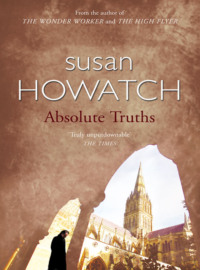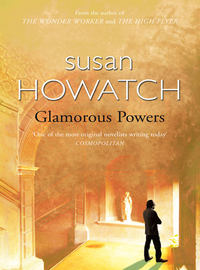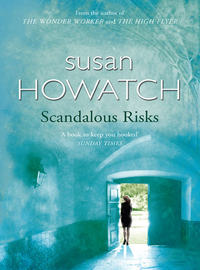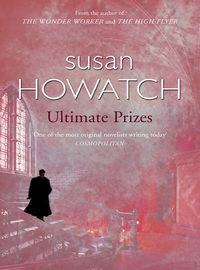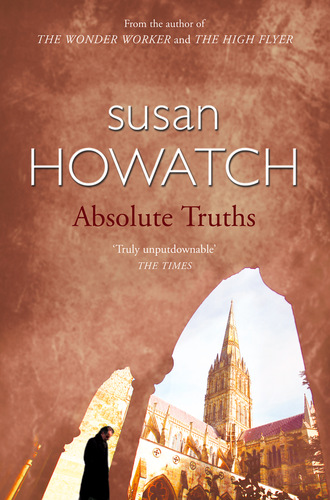
Полная версия
Absolute Truths
‘Does she take drugs?’
‘Of course not!’ But the denial was too fervent to be plausible, and when he saw I was unconvinced he added quickly: ‘Not hard drugs. Just pot occasionally. But everyone does that nowadays.’
‘Everyone most certainly does not! And I won’t tolerate any drug-taking under this roof!’
‘You don’t tolerate anything under this roof!’
‘I don’t tolerate self-destructive behaviour, and you wouldn’t respect me if I did!’
‘I’d respect you if you could admit the truth – which is that by living with Dinkie I’ve actually done her good!’
‘If you really wanted to do that pathetic young woman good,’ I said, ‘you’d love her without exploiting her. Obviously you need to justify your immorality by seeing yourself as a hero, but Dinkie’s not marrying you because you’re heroic – she’s marrying you because you’re the first man who’s ever been fool enough to propose!’
Lyle walked into the room just as Michael began to hurl unprintable abuse at me.
II
‘It’s suddenly occurred to me,’ she said to Michael as he at once fell silent, ‘that it might be better if you dined out. In fact I believe Dinkie’s now keen to do so. We’ve just finished our little talk together in my sitting-room.’
Michael was confused. ‘But what did you say to her?’
‘I pointed out that a meal from the deep-freeze would be rather an anti-climax after champagne and I told her about the wonderful food at the Crusader. No, don’t worry about money – dinner’s on us, of course, and your father will pay for your night at a hotel too.’
‘But Mum –’
‘Darling, it was wonderful to see you but let’s be absolutely clear-eyed for a moment, shall we? You know you can’t stay the night here – you’ll want to share a room with Dinkie and that would be wrong because your father’s forbidden it and since it’s his house he’s entitled to make the rules. So you’ll have to go to a hotel anyway, and although I could give you both dinner I’m not sure that would be a wise move. Just think: if you and your father are quarrelling now, after only five minutes together, how on earth could you survive a full hour in the dining-room? So darling, bearing in mind all these awful truths, don’t you think it would be much nicer for Dinkie if you dined at … no, not the Crusader. Too square. How about a romantic candle-lit dinner at La Belle Époque in Chasuble Lane? Go up to my sitting-room to have a word with her about it.’
‘Okay, but –’
‘And never forget, darling, that your father and I both desperately want you to be happy. Don’t we, Charles?’
‘Yes,’ I said.
Michael ignored me, gave her a look in which suspicion and relief were fleetingly intermingled, and withdrew from the room without further argument. I promptly collapsed into the nearest chair and covered my face with my hands.
‘Where’s your current drink, Charles?’ said Lyle briskly. ‘So far I’ve found one in the hall and one in the kitchen, neither of them finished. Are there any more?’
‘No.’ I let my hands fall. ‘What happened between you and Dinkie?’
‘Oh, she was no trouble at all. I dealt with her very quickly.’
Sheer admiration enabled me to exclaim: ‘How?’
‘I said: “How wonderful of you to want to marry Michael even though he’ll never have a penny more than he earns as a producer – such a shame the BBC are so stingy to their employees!” and she said: “But he’ll have lots of money in the end, won’t he, because the Bishop’s rich.” At which point I said: “Oh no, my dear, we don’t even own our own house, and as the Church is even stingier than the BBC the Bishop’s constantly worrying about how to make both ends meet.”’
‘But my capital – my private income – Michael must have told her –’
‘Oh, I just said it was almost all gone. All right, I know that was a fib, but if the Jesuits can say “the ends justify the means” I don’t see why I can’t do the same –’
‘But what end did you eventually reach?’
‘The one we want. After I’d trapped Dinkie into revealing her mercenary motive I said kindly: “If I were you I’d take an interest in Robert Welbeck. He’s much the richest young man in Marina Markhampton’s set, and has an income which I happen to know is over twenty thousand pounds a year.” I paused to let that sink in and then I added: “Net.”’
I was so dazed that all I could say was: ‘Is that true or false?’
‘True. Dinkie was stunned. “Gee, I had no idea!” she said, and I answered with immense sympathy: “I’m afraid in England gentlemen don’t talk about their incomes. So tiresome of them, isn’t it?” We ended up sitting on the sofa together and chatting like lifelong friends.’
Words finally failed me.
‘Of course she tried to tell me she was pregnant,’ said Lyle as an afterthought, ‘but I soon got her to admit the pregnancy is mere wishful thinking. The situation’s simply this: she’s in her mid-twenties, time’s ticking on and she knows she’s got to get a husband before the eligible men start regarding her as a has-been. I think she does like Michael, I’ll say that for her, and I’m sure she’s grateful that he’s given her free lodgings for so long, but the truth is she’s exploiting his idealistic infatuation, and I’m sure that if he thinks she’s been faithful to him, he’s deceiving himself. God knows what she gets up to when he goes away on location to shoot the outdoor scenes for his dramas, but of course poor Michael, welded to his idealism, would have overlooked all the signs of infidelity.’
‘If she’s been seeing other men while living with Michael she must be very disturbed.’ For the first time I caught a glimpse of Dinkie not as a stereotype but as a complex human being whose behaviour was more of a mystery than I had ever bothered to imagine. ‘I hope she doesn’t start taking hard drugs when things don’t work out as she wants,’ I said, troubled. ‘I hope this isn’t the beginning of a road to disaster.’
‘Oh, don’t be so stupid, Charles, of course it isn’t! The girl’s a classic gold-digger, tough as old boots, and in the end she’ll nail a rich husband and live happily ever after. No chance of that one ever dying young of an overdose of heroin!’
I made no attempt to argue because by that time my thoughts had returned to Lyle’s Machiavellian machinations. ‘Wait a moment,’ I said. ‘Isn’t there something you’ve forgotten? How’s Michael going to forgive you for pointing Dinkie at Robert Welbeck?’
‘Very easily because I’m now ninety-nine per cent sure that I was right and he came down here panting to be rescued from the whole ghastly mess. His idealistic dream of “saving” Dinkie proved impossible to endure in reality … Charles, if you’re going to light that cigarette you’d better do so before you tear it to pieces.’
I took off my clerical collar before flicking open my lighter. ‘But if what you say is true,’ I said at last, ‘why was Michael so angry with me for opposing the marriage?’
‘Because he knew you were right and he couldn’t stand it.’
‘But why couldn’t he have talked to me honestly?’ I was in despair. Finally I said: ‘I just don’t understand where I’ve gone wrong with that boy.’
‘Oh God.’
‘I’ve tried so hard to be a good father –’
‘Look, you need a drink – and for heaven’s sake don’t abandon this one when it’s only half-finished. Come and sit in the kitchen with me while I cook dinner.’
I stood up obediently but I was still grappling with despair. ‘If only I could understand what it all means –’
‘Darling, it means absolutely nothing except that parenthood can be hell and young men can make damned fools of themselves over tarts.’ She paused to give me a kiss. ‘It’ll all come right,’ she said at last, and added with unexpected fierceness: ‘I’ll make it all come right.’
We were just embracing each other as if to crush out my misery when yet again the telephone started to ring.
III
The hospital chaplain was ringing to let me know that Desmond had awoken from the anaesthetic but could remember nothing about the assault; the policewoman stationed at his bedside had departed and the doctor had again recommended that my next visit to the hospital should not take place until the following morning.
‘I feel like murdering that instrument,’ said Lyle, eyeing the telephone as I replaced the receiver. ‘Leave it off the hook while we have dinner.’
Before I could answer, Michael and Dinkie descended from Lyle’s upstairs sitting-room and announced their intention of dining at Jock’s Box, the local lorry-drivers’ café, before departing for London – a statement which drew a wail of protest from Lyle who begged him to leave the long drive until the following day.
‘I’d like to,’ said Michael, ‘but all I can afford is Jock’s Box and the petrol to take us home. I’m not going to let Dad buy me off with a flash of his cheque-book after giving us such a bloody awful reception.’
At this point I decided it would be best for all concerned if I withdrew from the scene so I retired to the cloakroom and did not emerge until I heard the front door close. Returning to the kitchen I demanded: ‘Did he allow you to write the cheque?’
‘No, but as soon as you were out of the way dinner at La Belle Époque became affordable and he said they’d bed down at the nearest guest-house … Where’s your drink?’
Retrieving my glass from the cloakroom I sat down again at the kitchen table and drank in a morose silence while Lyle cooked a mixed grill.
Afterwards as she washed up I distracted myself by switching on the television and staring at the news. Mr Kosygin had received a cool welcome in Peking. Frightful things were happening as usual in Vietnam … I dozed, but it was hardly surprising that I was exhausted. Sexual intercourse was not, for a man of my age, the wisest activity to indulge in before trying to survive a diocesan disaster and a family débâcle.
‘Worn out?’ said Lyle as we toiled upstairs to bed.
But unfortunately my brief doze had revived me and my brain was active again. ‘I’m so worried about Desmond,’ I confessed. ‘I forgot to tell you that according to Dido he was seen recently in Piccadilly Circus with a young man in black learner.’
‘What absolute poppycock – a sexy young man in black leather would never look twice at poor old Desmond!’
‘Poor old Desmond … There’ll be a terrible interview when he’s well enough to discuss the future – if I’m not careful he’ll wind up utterly pulverised.’
‘Being pulverised is the least he deserves and I can’t see why you should wallow in agony about it. Just offer him a full pension and boot him out on the grounds of ill-health. Personally I think he’ll be damned lucky. In the old days he’d have been tried in the ecclesiastical courts and booted out with nothing.’
‘But I can’t help feeling I’ve failed him in some way –’
‘Rubbish! You took him on, didn’t you, when no one else would touch him? If anyone’s failed Desmond it’s Malcolm, never noticing that Desmond was coming apart at the seams!’
‘And who’s responsible for Malcolm?’
‘Charles, you cannot blame yourself for this disaster, I absolutely forbid it! Malcolm slipped up, that’s all, but anyone can make a mistake, even a first-class archdeacon. Now stop agonising, stop thinking about wretched Desmond and switch off. Shall I run your bath for you?’
‘Thank you,’ I said dryly, ‘but I think I still have enough strength to turn on the taps.’
I had a long hot bath and repeated over and over to myself my mantra: ‘All things work together for good to them that love God’. Then I tried to think about Hippolytus and the sexually lax Bishop Callistus, but the thought of sexual laxness only reminded me of Michael and the moral wasteland of the 1960s and the horrible changes which were being made in the name of progress. Abolishing the grammar schools, ignoring coffee-bar hooliganism, showering publicity on gangsters like the Kray brothers, turning bad singers into idols, embracing American culture without discrimination (and what on earth was America getting up to in Vietnam anyway?), permitting mass-mockery of distinguished institutions, encouraging the destruction of moral standards, campaigning for the legalisation of homosexuality … I started thinking of Desmond again. Hauling myself out of the bath I opened the medicine cabinet to retrieve my indigestion tablets.
In my dressing-room I said my prayers and tried to meditate on a paragraph written by St Augustine, but my attention soon wandered. How would St Augustine have dealt with Desmond? No full pension rights in those days, no financial sop to offer a fallen brother-in-Christ, but would St Augustine have flinched from the prospect of a fearsome interview? Certainly not. Fortified by God’s grace and supremely confident in his ability to administer a Christian justice he would have faced Desmond without turning a hair.
Feeling episcopally inadequate I returned to the bedroom.
‘What was your meditation piece tonight?’ asked Lyle.
‘I chose a paragraph from The City of God.’
‘Splendid! That must have cheered you up,’ said Lyle with relief, and returned to her library book, a sex-offering by Françoise Sagan.
I picked up The Rector of Justin by Louis Auchinloss and began to toy with the fantasy of replacing the box in Desmond’s wardrobe so that he would never know I had discovered his pornography.
‘Can you really read that book upside down?’ enquired Lyle with interest.
‘No.’ I reversed the book before adding: ‘In the bath I was thinking about Hippolytus and Callistus. No doubt Hippolytus would have urged that Desmond be drummed out of the Church while Callistus would have made some excuse to keep him in.’
‘Callistus reminds me of Bishop Robinson being soppy about sex in Honest to God. Incidentally one of the women in the prayer-group said that excruciatingly boring book actually brought her to Christianity. Yet another example of how God moves in mysterious ways.’
I said vaguely: ‘I must hear about that prayer-group sometime,’ and putting aside my book I switched off the light on my side of the bed. ‘If Callistus were alive today,’ I remarked, ‘he’d be like that new bishop of Radbury, Leslie Sunderland. He has such an optimistic view of human nature that he believes everyone can be brought to Christian perfection by a rational outlook, a decent wage and the National Health Service. In fact when I see him tomorrow at my committee meeting I’m sure he’ll –’ I broke off and sat bolt upright in bed. ‘Ye gods and little fishes! I haven’t looked at those graphs which I have to present to the committee!’
‘Darling, SWITCH OFF. Leave all that until tomorrow – you can perfectly well study the graphs on the train to London. Do you want one of my sleeping pills?’
But I distrusted sleeping pills. They made me feel sluggish the next morning, and I needed my brain to be crystal clear from the moment I woke up. I tried to calm myself by another silent recitation of my mantra.
But I never derived much benefit from mantras. Too often I allowed my mind to drift away down theological avenues, and that night I started thinking of St Paul, writing ‘All things work together for good’ in his letter to the Romans – which had prompted Karl Barth to write his great commentary – which had led to Neo-Orthodox theology – which was a reaction to the liberal theology which had been prevalent before the First War – in which so much idealism had been destroyed – with the result that the atmosphere at the start of the last war had been very different – as I had realised when I had volunteered to be a chaplain – who had been captured at the fall of Tobruk – which had led to that POW camp – and to the concentration camp – which reminded me of Desmond – everyone degraded – cut off from God – in hell …
I slept.
IV
In my dream I was back in the concentration camp. A naked Desmond was being flogged by Nazi guards while I stood by, powerless to stop them and hating God for not saving me from this undeserved and unbearable ordeal. After my capture at Tobruk in 1942 I had been confined to an ordinary POW camp, but in 1944 after I had assisted several men to escape I had been transferred to a far harsher environment. I had consoled myself at the time by thinking that at least I had not been summarily shot. Later I had come to believe that a quick death would have been preferable to dying by inches. But I had not died. The Allies had arrived and my ordeal had ended. The liberators had all looked so fleshy and pink. I could still see their appalled expressions.
I had wanted to thank God for the deliverance but the words had refused to come; he had been absent so long – or so I had thought – that I had forgotten how to talk to him, although of course I had always put up a front and gone through the motions of being a priest. That was what the army had required of me and that was what I had to do to the end, regardless of whether my faith was shattered or not. Later I had realised that this obstinate, distorted sense of purpose had helped to keep me alive, and later still I had seen that God had not been absent at all but had instead been speaking to others through the medium of my battered self, but these insights had not been immediately apparent to me.
After the war I had made sense of my suffering by classifying it as a ‘showing’ – not of God but of the Devil. Or, to put the matter in less emotive terms, I had seen it as an unforgettable demonstration of what happened when men turned aside from the truth in order to embrace a false ideology. Indeed it was this sojourn in a world born of absolute lies which had made me resolve to battle all the harder for the absolute truths. Such a battle, I had reasoned, would justify my spared life, neutralise my survivor’s guilt and simultaneously enable me to align myself with God as he worked to redeem all the suffering which people had inflicted on one another during the war.
So every time I now took a tough line on sin I felt I was in some small way redeeming the horror and agony I had witnessed in the past. My experiences in Starbridge in 1937 had given me a particular horror of sexual sin, but it was the concentration camp which had given me a horror of all evil. ‘The only thing necessary for the triumph of evil,’ Burke had written, ‘is for good men to do nothing.’ No one was ever going to catch me doing nothing. Mocking criticism in the press might hurt, television debates might inwardly reduce me to pulp, the scorn of the younger generation might continually sear me, but all that was of no consequence. What did such trivial distress matter when I recalled the appalling suffering of those who had died in the concentration camps? To whine that I hated being mocked for my views was unthinkable. The fact was that I had lived while others had died, and my job now was to bear witness to the truth no matter how much it cost me to do so.
In my dream the Nazi guards stopped flogging Desmond and began to castrate him. Sweating with horror I awoke just in time to stop myself shouting out loud and waking Lyle. In my dressing-room I switched on the light, sat down and began to shudder repeatedly with revulsion.
After a while I stopped shuddering but my distress, as memories of the camp streamed through my mind in an unstoppable tide, was so acute that I could only ease it by pacing up and down. I was just beginning to think I would never be able to dam this terrible cataract when Lyle looked in.
Before I could apologise for waking her she said severely: ‘All this pacing’s very bad for you. Come back to bed instead and tell me how ghastly you’re feeling.’
Staggering into her arms I allowed myself to be steered back between the sheets.
‘Which nightmare was it?’
‘The flogging-castration. But this time the victim was Desmond.’
‘That wretched Desmond! Poor darling,’ said Lyle, giving me a lavish kiss.
I at last began to relax. Glancing at the clock I remarked: ‘I can hardly believe that only twelve hours ago we were here enjoying my afternoon off with no thought of either Desmond or Dinkie.’
‘I detest that girl.’
‘So do I. I can’t understand why Michael finds her so attractive.’
‘Can’t you, Charles? Honestly?’
‘Honestly. I’ve never been attracted to stupid women.’
‘That’s because you’re reacting against your mother.’
‘Nonsense! It’s because I want more from a woman than just sex!’
‘How much more?’
I laughed.
Lyle gave me another lavish kiss and said: ‘That was a sterling performance you gave this afternoon.’
‘At my age I probably won’t be able to repeat it for at least two weeks. I can’t tell you how geriatric I felt this evening when I was watching the news.’
‘Then don’t. Words like “geriatric” bore me. And anyway, if you’re really so enfeebled why were you pacing up and down just now like a sex-starved tiger at the zoo?’
‘More like a mangy old lion in the first stages of senility!’
‘All right, if you’re really so past it, even after several hours’ sleep, let’s just blot out your nightmare by having a friendly cuddle.’
‘What a loathsome phrase!’
‘I’d never have uttered it if you hadn’t behaved as if you were ripe for a coffin! Honestly, British men are the limit sometimes – any Frenchman would be absolutely panting to demonstrate his vitality by this time!’
I tried a pant or two. I do in fact have some French blood flowing in my veins as the result of a Victorian indiscretion unrecorded in the Ashworth family tree, and Lyle had said once that if I had been born in France and escaped my middle-class English upbringing I might have become one of those Frenchmen who drink for hours in raffish Parisian cafés and supplement their long-suffering wives with a succession of pretty mistresses. My comment on this fantasy had been: ‘I’d have missed my golf and cricket,’ but Lyle had retorted: ‘No, you wouldn’t – you’d have been much too busy elsewhere.’
But I could not quite imagine a life in which I was not a clergyman of the Church of England, and I suspected that if I had been a French layman I would have long since expired as the result of sexual exhaustion and liver failure.
‘You’re better off married to an Englishman,’ I said to Lyle.
‘I know, but I always adore being convinced.’
I forgot Desmond and Dinkie, just as Lyle had known I would. I forgot the pornography in the present and the putrefaction in the past. I forgot I was a bishop. I even forgot I was a clergyman. I had entered a world in which only Lyle and I existed, a comforting cocoon in which I could feel secure and cherished, enfolded by a love which excluded all pain, all anxiety and all the baffling complexity of my current existence.
Later Lyle said: ‘I can never resist seducing you when you get as haggard and tormented as a nineteenth-century poet.’
‘I must try and be haggard and tormented more often.’
We laughed, stubbing out our cigarettes, and gave each other one last embrace before falling asleep.
But I had not reached the end of the exhausting stream of crises which had been battering me towards the abyss, and in fact the worst crisis was still to come.
V
Following my usual routine I rose at half-past five and made myself some tea which I took to my dressing-room. No matter how crowded my timetable was for the day ahead, I devoted at least the first hour to being myself, alone with my Maker; I was recharging my spiritual batteries. While I drank my tea I focused my mind on the coming day and recalled, item by item, all I had to do. Then I prayed that I would do everything in a manner acceptable to God and I prayed for God’s grace and God’s help. Afterwards, if I had no plans to attend a service of matins, I said the office before moving on to my reading.


